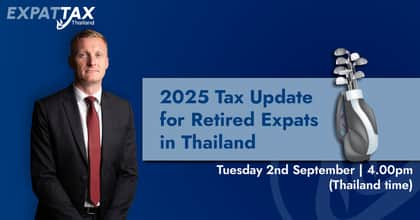The Constitutional Court’s removal of Prime Minister Paetongtarn Shinawatra has left Thailand in a state of political limbo. A caretaker government is now in place while parliament negotiates a new coalition and selects the next leader.
For expats, the key point is this: major tax reforms are unlikely to move forward in the short term. Until the political situation stabilises, the Revenue Department will continue applying the rules already in force.
One topic that has generated considerable discussion is the proposed two-year exemption on overseas income. The idea was that income remitted in the year it arose or the following year would be exempt from Thai tax.
Although this proposal was floated by the Revenue Department earlier in 2025, it has not been enacted. Nothing changes until new legislation or Revenue Department rules are published in the Royal Gazette, and in the current political climate, that is unlikely to be a priority.
For now, expats should work on the basis that assessable overseas income remitted in 2025 is taxable and must be declared on their return.
The Current Thai Tax Rules
These are the rules in force today. They will remain the basis for your 2025 tax return unless and until new legislation is formally published in the Royal Gazette.
Personal Income Tax Current Rules
- Tax brackets remain at 0–35%, with no adjustments announced.
- The 180-day residency rule, as outlined in Section 41 of the Revenue Code, continues to determine whether you are a Thai tax resident.
- Any proposals to restructure the brackets or broaden the tax base are on hold until a new government is in place.
Foreign Income Remittance – Current Rules
Foreign-sourced income remains the biggest concern for expats. The position is set out in two Revenue Department Orders:
- Por.161/2566: Income earned in 2024 or later is taxable in Thailand if you were resident in the year it arose, and you remit it — whether that remittance happens in the same year or in later years.
- Por.162/2566: Income earned before 2024 is exempt if remitted from 2024 onwards.
In practice, this means that any assessable overseas income remitted in 2025 is subject to Thai tax and must be included on your return.
Two-Year Foreign Income Exemption Speculation
There has been widespread press speculation about the possibility of a two-year exemption for overseas income, allowing remittances to be tax-free if brought into Thailand in the year they arose or the following year.
It is important to stress that this is not a formal proposal from the Revenue Department. It has not been published in the Royal Gazette, which means it is not law. With the government operating in caretaker mode, it is highly unlikely that any such measure will be introduced in the current tax year.
This is not the first time such speculation has spread. Only a year ago, there was widespread reporting that Thailand was considering taxing worldwide income. That, too, underlines the simple truth: until something is published in the Royal Gazette, it does not take effect.
For now, expats should continue to plan based on the current rules.
Five-Year Crypto Gain Exemption
Crypto taxation remains another area under close watch.
- In June 2025, the Cabinet approved a five-year personal income tax exemption on capital gains from crypto and digital tokens traded on SEC-licensed Thai exchanges (from 1 January 2025 to 31 December 2029).
- The exemption is not yet in effect. It only becomes law once it is formally published in the Royal Gazette.
- Transactions on foreign exchanges or unlicensed platforms remain taxable under current rules.
Until the Gazette confirms the exemption, expats should assume that all crypto gains remitted into Thailand remain taxable.
How to Prepare for Your 2025 Tax Filing
- Plan on the existing tax brackets — personal income tax rates remain at 0–35%, so calculate your liability on that basis.
- Check your residency status — spending 180 days or more in Thailand during the year makes you a tax resident, with full reporting obligations.
- Be careful with remittances — under Section 41, all assessable overseas income (including earnings, pensions, capital gains and rental income) is taxable if remitted.
- Treat crypto gains as taxable — until the five-year exemption is published in the Royal Gazette, assume all remitted crypto profits fall under current rules.
- Expect no new reforms — with a caretaker government, don’t rely on changes being introduced this year. Prepare to file conservatively and in accordance with the current rules.
Stay Ahead with Trusted Updates
Thailand’s tax landscape is full of rumours and speculation, but the reality is simple: nothing changes until it is published in the Royal Gazette. With politics unsettled, the rules for 2025 will likely remain the same.
Sign up for our Tax Alerts to stay informed of every official update — from remittance rules to crypto exemptions. Our alerts are concise, practical, and written specifically for expatriates in Thailand. If you have questions about how the current rules affect you or want clarity on your own situation, book a free call with our team. We’ll discuss your circumstances and provide you with clear, practical guidance.


